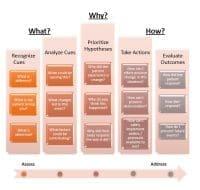As the clock slowly pushed toward three o’clock, motionless hands grinding the gears that perpetuate the workday stood as a moribund reminder of each still moment. Like the last grains of sand in an hourglass waiting to fall, time stood completely still. Conversations with coworkers and small talk about life filled the void that time left behind. When the call came from the fire department that a full arrest was a few minutes out, everyone was ready.
Everyone took their place and found an intrinsic comfort in the chaos that swarms a code. Everyone but me, that is. I had not been in a code before and just completed my Advanced Cardiac Life Support (ACLS) training. The emotions crawled into every nook and cranny of my thought process, leaving me with doubt, anxiety, and hopelessness. As I aimlessly circled the room, looking for something to do…something impossible to mess up, I found myself lost in the moment. I tried to collect my thoughts and remember everything that I learned in class. That’s when the attending told his residents that nurses have more experience and training in codes.
In fewer than 5 minutes, I went from a confused, anxious, and inept nurse to an expert—if only I.V. cannulation was so quickly mastered, I thought. To make things worse, I was put in charge of the code. Not only would I have to figure out my own role and responsibility, I must direct others. I was in charge of someone else’s life and felt the responsibility of their outcome rested on my shoulders. I felt insecure and uncomfortable with the situation, unsure if I would be able to perform.
As the patient arrived, a report was given. The salient facts were all I could hold onto. The patient was found unresponsive, with no known history, no family, and an unknown time down. It was a perfect plot for mystery show, but there was no editing or final production of this episode, only the choreography of fate. As the team continued resuscitation, I timed the progress and gave medication orders from the ACLS algorithm. I managed my first code while the physician got to look at the bigger picture and review potential causes. We worked together and discussed what had been done, what could be done, and determined the best course of action.
Running that code was the thrill of a lifetime but it quickly became a pivotal moment in my career—a moment where I was relied on and delivered my best performance without any hesitation. In sports, athletes spend countless hours preparing and training for a single moment that defines their career. Under the tutelage of their coach, they will grow and develop as an athlete and peak for their championship performance. After winning a championship or medal, an athlete can celebrate and caravan their victory until the next season. Surrounded by countless fans their success is carved into immortality by the trophies and highlight reels that will replay their greatest moments for all to see.
Unlike athletes, emergency nurses, first responders, and physicians must be able to deliver a world-class performance without any advance notice, whether it’s a gunshot, house fire, or a terrorist attack. Victories are few, celebrations are short, and the celebrants applauding our lonesome parade back to our car are even fewer. There are no endorsement deals to supplement our income and no fans cheering in the corner to keep the excitement going when all seems lost.
Eric Keller is an RN in the emergency department at Cleveland Clinic Akron General in Akron, Ohio.
Read more articles from the Insights Blog here



















2 Comments.
Sounds like a NICU @CHM in the DMC ! Esp. with so many inexperienced RNs working by themselves in private rooms. Hardly have any time to observe codes when they r overwhelmed w their patient load. No peer mentorship is dangerous… As a retired RN from that unit for 39 years (17 yrs of that as Manager) glad I HAD to retire on Disability due to a left bka! Don’t think I could work like that model. We r a teaching institute but in our intermediate rooms we had a max of 6 babies on each side of the pod w a nursing station in between. I feel strongly that a 6wk orientation is NOT adequate time to work in a Level 4+ tertiary NICU. You can the bulk of your training by observing the experienced nurses on the unit and asking tons tons of questions, even if ther’s only 2 RNs for 12 patients!!! Teamwork is really broken OR built in a 12 hr shift.
Hi Eric,
Thank you for this vulnerable yet very encouraging article. As a nurse of many years, many times in my mind I feel inadequate and wonder if I am actually a good enough nurse if in a real emergency situation. It helps to know that we are to “bloom where we are planted” and you did just that. Very encouraging to me.
Thank you.